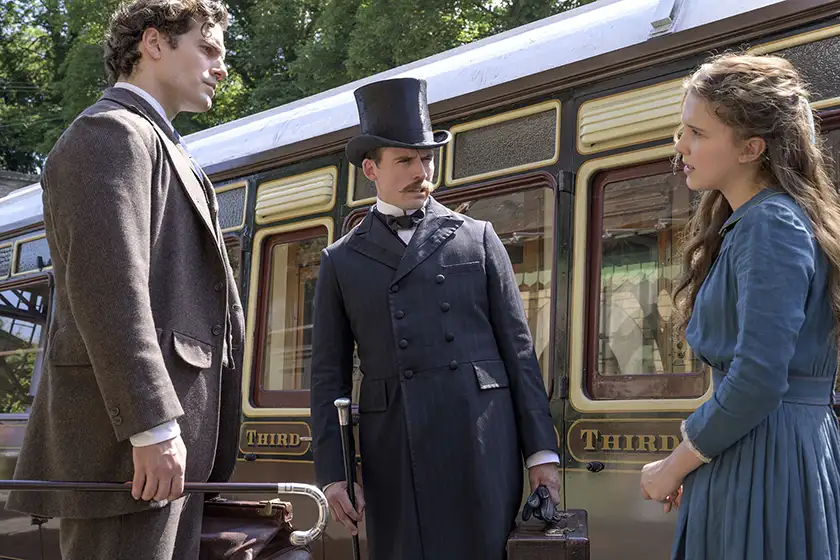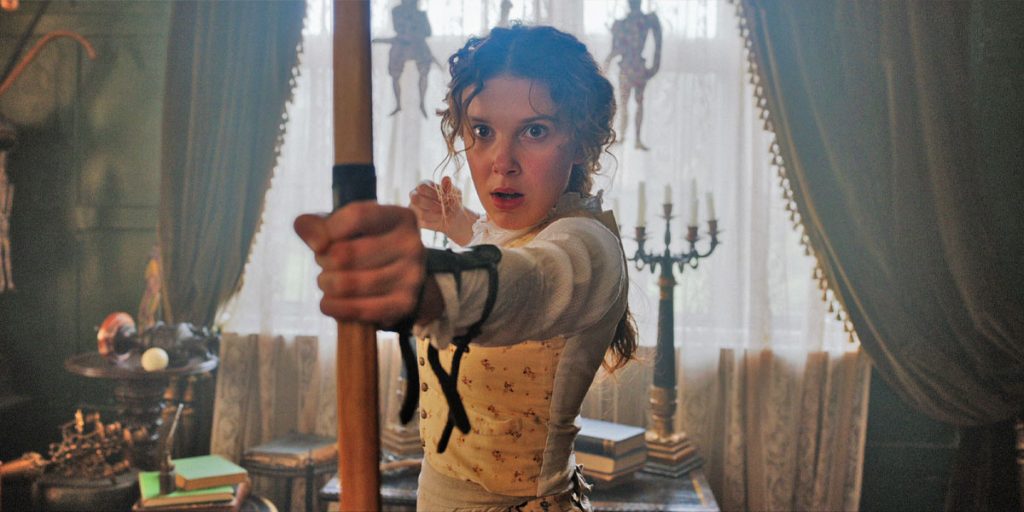Enola Holmes is an intriguing mystery propelled by an energetic performance by Millie Bobby Brown and a script that keeps the audience invested throughout.
Since its initial publication in 1887, Sir Arthur Conan Doyle’s Sherlock Holmes series has been adapted over 250 times in every medium from print to film to radio, making him far and away the most adapted literary character. This is mainly due to the wide appeal of the writing style of the novels. Mystery stories already hold a wide appeal, and Conan Doyle’s technique of having a genius protagonist who can clearly and simply explain complex plots have helped his stories to age like fine wine, making them just as exciting to read over 130 years since their initial publication. With Enola Holmes, director Harry Bradbeer (Fleabag) and writer Jack Thorne (Wonder) take the popular spin-off series by Nancy Springer and create an exhilarating family film that holds its own alongside the other recent Netflix releases of The Devil all the Time and I’m Thinking of Ending Things.
Enola Holmes wastes no time getting started. Immediately, we are introduced to our titular character (Millie Bobby Brown) biking down the lush countryside firing narration at us about everything from her mother (Helena Bonham Carter) and her peculiar parenting styles to her two older brothers Mycroft and Sherlock (Sam Claflin and Henry Cavill, respectively) whom she hasn’t seen in years. Bradbeer draws on his experience bringing Phoebe Waller Bridge’s fourth-wall-breaking Fleabag script to life to give Brown various asides throughout that help move the story along and develop her character in a fun and engaging way. Thorne’s script takes care to accentuate the difference between Enola’s brand of crime-solving and that of her older brother. Where Sherlock uses the power of logic and deduction to solve his cases, Enola’s tactics are much less refined, drawing on memories and frequently putting herself in danger to track down her mother, who has vanished on her 16th birthday.

Once Enola’s mother leaves the picture, her brothers are quick to fill the parental gap she left. Swooping in to figure out where their mother went and generally giving little thought to Enola, whom they decide to send to a boarding school to make her a proper young lady. Neither of the Holmes’s brother roles are very demanding, but Claflin and Cavill manage to inject life into these iconic characters that are reminiscent of previous iterations but still wholly new. Claflin imbues Mycroft with a pompous nature and naïve attitude towards everything that doesn’t concern him, he is insistent on Enola becoming a woman of society and is the closest thing the first act of the film has to an antagonist as he repeatedly blocks Enola from helping with the brother’s investigation. Cavill’s interpretation of the iconic detective ignores both the fast-talking antics of Robert Downey Jr in the Guy Ritchie films and the cold uncaring demeanor of Benedict Cumberbatch in the BBC series, for a more laid-back role that paints him simply as an extremely intelligent man who wishes to solve mysteries and nothing more. Both come in stark contrast to Brown’s vigorous performance as a young woman eager to experience the world and follow in the footsteps of her family.
Soon after the Holmes brothers enter the picture, Enola butts heads with the stiff patriarchy of early 20th century England. Having never left her country home, it comes as a rude awakening when she meets the hard truth about the status of women at the time. From here, Enola Holmes adopts a feminist perspective not too different from Greta Gerwig’s Little Women adaptation, a simple thesis that women are no less capable than men and do not need to define themselves by their relationship to the opposite sex. It’s a pretty simple idea that the film carries throughout the rest of its runtime, as Enola continues to carve her legacy separate from that of her brothers while still acknowledging when she occasionally needs help. Frequently, she trades clothes with lower-class male citizens to gain access to areas otherwise blocked to her, and on more than one occasion her femininity is the key to uncovering a new clue or revelation.
The main plot of Enola Holmes actually has very little to do with the disappearance of Enola’s mother, though it is followed up and given room to expand in a possible sequel. Instead, the majority of the running time is dedicated to solving the attempted murder of the young noble Viscount Lord Tewksbury (Louis Partridge), who has become a member of the house of lords following the suspicious death of his father. The mystery isn’t all too complicated, but still contains a clever last-minute twist that will make sense if audiences have been paying enough attention. The chemistry between Brown and Partridge is charming and believable, while Burn Gorman’s performance as a hired killer who pursues the pair is a more than acceptable replacement for the main Holmes villain Professor Moriarty.
Outside of the story elements, Enola Holmes is surprisingly rich in its technical aspects. Giles Nuttgen’s (Hell or High Water) cinematography fills the country scenes with a pastel color palette that pops off the screen while giving turn of the century England an appropriately washed-out look, artfully contrasting the two different environments. The score by Daniel Pemberton (Spider-Man: Into the Spider-Verse and The Man from U.N.C.L.E) is one of the most dynamic of the year and constantly shifts to heighten the excitement of the fight scenes and enhance the emotional moments. None of these achievements were necessary, as the film would have worked just as well had these decisions not been made, but, with them, the film becomes a treat for both the eyes and the ears, which is increasingly rare in family films.
As the budgets for Netflix original films increase and bigger names are attracted, it’s clear that the company has drastically changed from the video rental service it started as in 1997. In 23 years, they have become one of the forefront names in the film industry, which has only been heightened by the recent pandemic, making them and the other streaming services one of the few places where new films can be seen. It’s nice to see that among the sea of awards bait films there is still a place for solid family entertainment with a mass appeal. It probably won’t end up on anybody’s best of the year list, but Enola Holmes is a wonderful film for both adults and children and doesn’t deserve to be overlooked.

